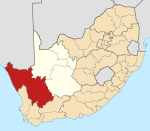
African Americans are an ethnic group of Americans with total or partial ancestry from any of the Black racial groups of Africa. The term African American generally denotes descendants of enslaved Africans who are from the United States, while some Black immigrants or their children may also come to identify as African-American.

The Central African Republic is a landlocked country in Central Africa. It is bordered by Chad to the north, Sudan to the northeast, South Sudan to the southeast, the DR Congo to the south, the Republic of the Congo to the southwest, and Cameroon to the west.

Pretoria is one of South Africa’s three capital cities, serving as the seat of the executive branch of government, and as the host to all foreign embassies to South Africa.

A raven is one of several larger-bodied species of the genus Corvus. These species do not form a single taxonomic group within the genus.

Eswatini, officially the Kingdom of Eswatini, sometimes written in English as eSwatini, and formerly and still commonly known in English as Swaziland, is a landlocked country in Southern Africa. It is bordered by Mozambique to its northeast and South Africa to its north, west, and south. At no more than 200 kilometres (120 mi) north to south and 130 kilometres (81 mi) east to west, Eswatini is one of the smallest countries in Africa; despite this, its climate and topography are diverse, ranging from a cool and mountainous highveld to a hot and dry lowveld.
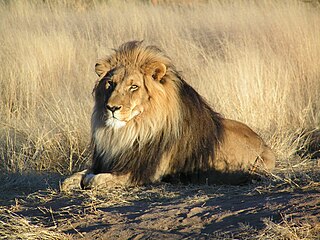
The lion is a large felid of the genus Panthera native mainly to Africa. It has a muscular, deep-chested body, short, rounded head, round ears, and a hairy tuft at the end of its tail. It is sexually dimorphic; adult male lions have a prominent mane. With a typical head-to-body length of 184 to 208 cm they are larger than females at 160 to 184 cm. It is a social species, forming groups called prides. A lion pride consists of a few adult males, related females and cubs. Groups of female lions usually hunt together, preying mostly on large ungulates. The lion is an apex and keystone predator; although some lions scavenge when opportunities occur and have been known to hunt humans, the species typically does not.

Berbers or Imazighen are an ethnic group mostly concentrated in North Africa, specifically Morocco, Algeria, Tunisia, Libya, the Canary Islands, and to a lesser extent in Mauritania, northern Mali, and northern Niger. Smaller Berber populations are also found in Burkina Faso and Egypt's Siwa Oasis.
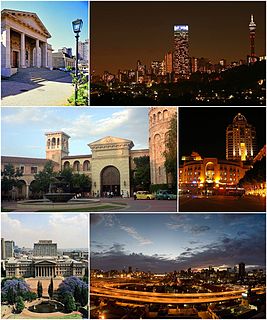
Johannesburg, informally known as Jozi,Joburg, or "The City of Gold", is the largest city in South Africa, classified as a megacity, and is one of the 50 largest urban areas in the world. It is the provincial capital and largest city of Gauteng, which is the wealthiest province in South Africa. Johannesburg is the seat of the Constitutional Court, the highest court in South Africa. Most of the major South African companies and banks have their head offices in Johannesburg. The city is located in the mineral-rich Witwatersrand range of hills and is the centre of large-scale gold and diamond trade. It was one of the host cities of the official tournament of the 2010 FIFA World Cup – and it hosted the final.
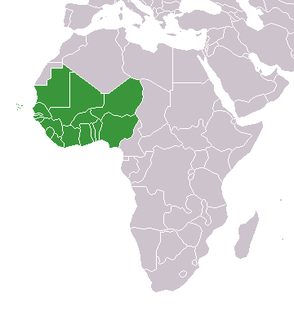
West Africa or Western Africa is the westernmost region of Africa. The United Nations defines Western Africa as the 17 countries of Benin, Burkina Faso, Cape Verde, The Gambia, Ghana, Guinea, Guinea-Bissau, Ivory Coast, Liberia, Mali, Mauritania, Niger, Nigeria, Senegal, Sierra Leone, and Togo as well as Saint Helena, Ascension and Tristan da Cunha. The population of West Africa is estimated at about 381 million people as of 2018, and at 381,981,000 as of 2017, of which 189,672,000 are female and 192,309,000 male.
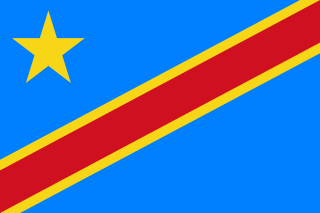
The Democratic Republic of the Congo (DRC), also known as Congo-Kinshasa, DR Congo, the DROC, the DRC, or simply either Congo or the Congo, and historically Zaire, is a country in Central Africa. It is, by area, the largest country in sub-Saharan Africa, the second-largest in all of Africa, and the 11th-largest in the world. With a population of around 105 million, the Democratic Republic of the Congo is the most populous officially Francophone country in the world, as well as the 3th-most populous country in Africa and the 14th-most populous country in the world. It is a member of the United Nations, Non-Aligned Movement, African Union, and COMESA. Since 2015, the Eastern DR Congo has been the site of an ongoing military conflict in Kivu. The capital and largest city is Kinshasa.

William Edward Burghardt Du Bois was an American sociologist, socialist, historian, civil rights activist, Pan-Africanist, author, writer and editor. Born in Great Barrington, Massachusetts, Du Bois grew up in a relatively tolerant and integrated community, and after completing graduate work at the University of Berlin and Harvard, where he was the first African American to earn a doctorate, he became a professor of history, sociology and economics at Atlanta University. Du Bois was one of the founders of the National Association for the Advancement of Colored People (NAACP) in 1909.

Durban, nicknamed Durbs, is the third most populous city in South Africa after Johannesburg and Cape Town and the largest city in the South African province of KwaZulu-Natal. Durban forms part of the eThekwini Metropolitan Municipality, which includes neighboring towns and has a population of about 3.44 million, making the combined municipality one of the largest cities on the Indian Ocean coast of the African continent. Durban was one of the host cities of the 2010 FIFA World Cup.

The San peoples, or Bushmen, are members of various Khoe, Tuu, or Kxʼa-speaking indigenous hunter-gatherer groups that are the first nations of Southern Africa, and whose territories span Botswana, Namibia, Angola, Zambia, Zimbabwe, Lesotho and South Africa. In 2017, Botswana was home to approximately 63,500 San people, which is roughly 2.8% of the country's population, making it the country with the highest population of San people.
African-American culture refers to the contributions of African Americans to the culture of the United States, either as part of or distinct from mainstream American culture. The distinct identity of African-American culture is rooted in the historical experience of the African-American people, including the Middle Passage. The culture is both distinct and enormously influential on American and global worldwide culture as a whole.

Apartheid was a system of institutionalised racial segregation that existed in South Africa and South West Africa from 1948 until the early 1990s. Apartheid was characterized by an authoritarian political culture based on baasskap, which ensured that South Africa was dominated politically, socially, and economically by the nation's minority white population. According to this system of social stratification, white citizens had the highest status, followed by Asians and Coloureds, then black Africans. The economic legacy and social effects of apartheid continue to the present day.

Africa is the world's second-largest and second-most populous continent, after Asia in both cases. At about 30.3 million km2 including adjacent islands, it covers 6% of Earth's total surface area and 20% of its land area. With 1.3 billion people as of 2018, it accounts for about 16% of the world's human population. Africa's population is the youngest amongst all the continents; the median age in 2012 was 19.7, when the worldwide median age was 30.4. Despite a wide range of natural resources, Africa is the least wealthy continent per capita, in part due to geographic impediments, legacies of European colonization in Africa and the Cold War, predatory/neo-colonialistic activities by Western nations and China, and undemocratic rule and deleterious policies. Despite this low concentration of wealth, recent economic expansion and the large and young population make Africa an important economic market in the broader global context.

South Africa, officially the Republic of South Africa (RSA), is the southernmost country in Africa. With over 59 million people, it is the world's 23rd-most populous nation and covers an area of 1,221,037 square kilometres. South Africa has three capital cities: executive Pretoria, judicial Bloemfontein and legislative Cape Town. The largest city is Johannesburg. About 80% of South Africans are of Black African ancestry, divided among a variety of ethnic groups speaking different African languages. The remaining population consists of Africa's largest communities of European, Asian, and Multiracial ancestry.

A continent is one of several large landmasses. Generally identified by convention rather than any strict criteria, up to seven regions are commonly regarded as continents. Ordered from largest in area to smallest, these seven regions are: Asia, Africa, North America, South America, Antarctica, Europe, and Australia. Variations with fewer continents may merge some of these, for example some systems include Eurasia or America as single continents.
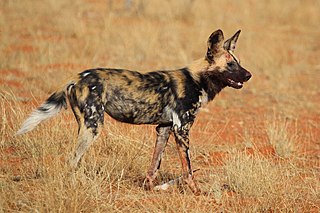
The African wild dog is a canine which is a native species to sub-Saharan Africa. It is the largest wild canine in Africa, and the only extant member of the genus Lycaon, which is distinguished from Canis by dentition highly specialised for a hypercarnivorous diet, and a lack of dewclaws. It is estimated that about 6,600 adults live in 39 subpopulations that are all threatened by habitat fragmentation, human persecution and outbreaks of diseases. As the largest subpopulation probably consists of less than 250 individuals, the African wild dog has been listed as endangered on the IUCN Red List since 1990.
African-American names are an integral part of African-American tradition. While many black Americans use names that are popular with wider American culture, a number of specific naming trends have emerged within African-American culture. Black names are often derived from existing Biblical names, Arabic and Muslim names, French names, and other European names.




















